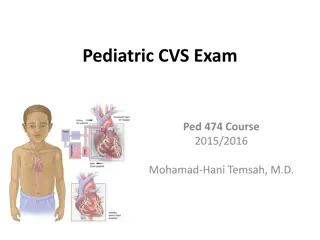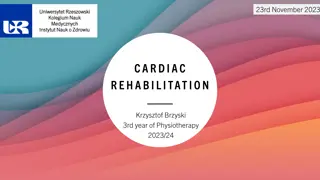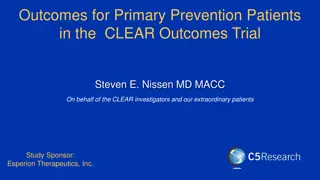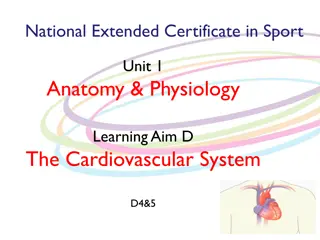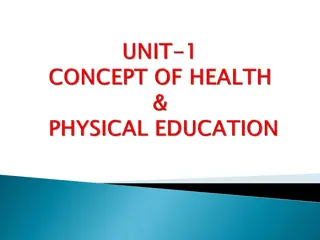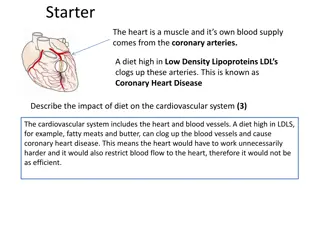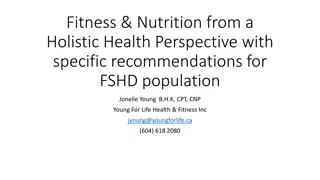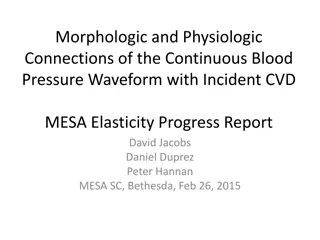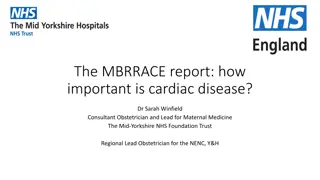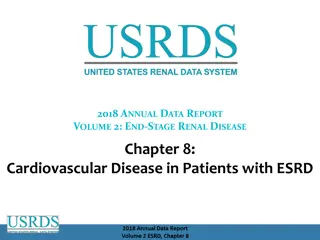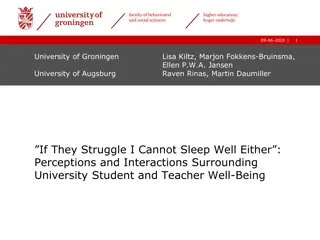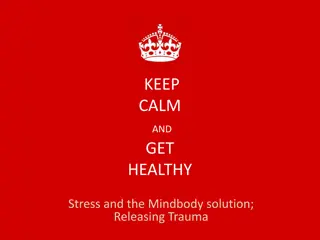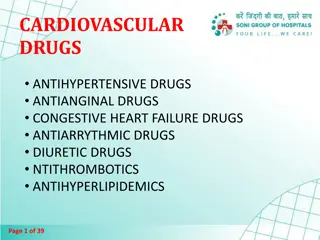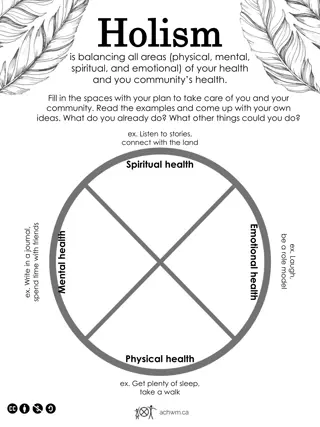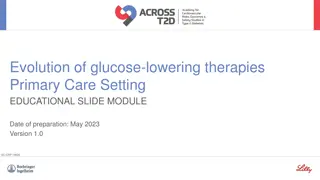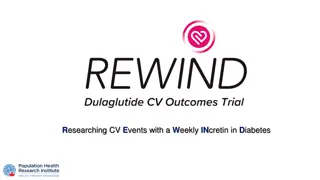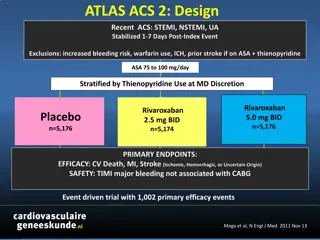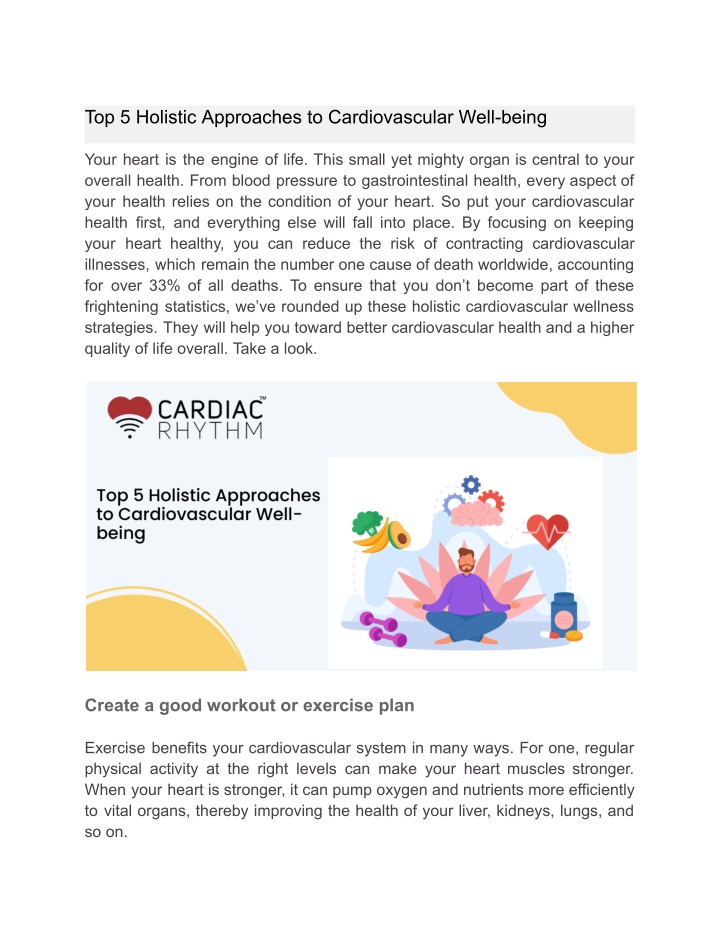
Top 5 Holistic Approaches to Cardiovascular Well-being
Your heart is the engine of life. This small yet mighty organ is central to your overall health. From blood pressure to gastrointestinal health, every aspect of your health relies on the condition of your heart. So put your cardiovascular health firs
Download Presentation

Please find below an Image/Link to download the presentation.
The content on the website is provided AS IS for your information and personal use only. It may not be sold, licensed, or shared on other websites without obtaining consent from the author. If you encounter any issues during the download, it is possible that the publisher has removed the file from their server.
You are allowed to download the files provided on this website for personal or commercial use, subject to the condition that they are used lawfully. All files are the property of their respective owners.
The content on the website is provided AS IS for your information and personal use only. It may not be sold, licensed, or shared on other websites without obtaining consent from the author.
E N D
Presentation Transcript
Top 5 Holistic Approaches to Cardiovascular Well-being Your heart is the engine of life. This small yet mighty organ is central to your overall health. From blood pressure to gastrointestinal health, every aspect of your health relies on the condition of your heart. So put your cardiovascular health first, and everything else will fall into place. By focusing on keeping your heart healthy, you can reduce the risk of contracting cardiovascular illnesses, which remain the number one cause of death worldwide, accounting for over 33% of all deaths. To ensure that you don t become part of these frightening statistics, we ve rounded up these holistic cardiovascular wellness strategies. They will help you toward better cardiovascular health and a higher quality of life overall. Take a look. Create a good workout or exercise plan Exercise benefits your cardiovascular system in many ways. For one, regular physical activity at the right levels can make your heart muscles stronger. When your heart is stronger, it can pump oxygen and nutrients more efficiently to vital organs, thereby improving the health of your liver, kidneys, lungs, and so on.
In terms of what particular exercises boost heart health, Cardiac Rhythm recommends the following types in particular: 1.Aerobic exercises: These entail moderate to vigorous fitness activities that include jumping rope, running, and swimming among others. Our experts recommend that you do about 30 minutes of aerobic exercises daily with 2 rest days a week. 2.Resistance training: Also known as strength work, it covers weightlifting, squats, push-ups, and resistance bands. The ACSM recommends 2 resistance training days a week, with at least 48 hours rest in between. 3.Balance, flexibility, and stretching workouts: These types of workouts improve your musculoskeletal foundation, in addition to improving blood flow around the body. Our experts recommend stretching before and after each exercise. Monitor your cardiovascular health proactively Do you know your average heart rate at rest? Are you aware of your family s medical history when it comes to heart disease? These are just a handful of data points that you need to monitor and track so that you can identify and manage heart disease early, and possibly avoid it altogether. To this end, you ll need to regularly perform ECG screening, preferably at least once a year, or more frequently depending on the advice of your physician. You can choose to partner with an RPM provider such as Cardiac Rhythm, where we offer you comfortable and feather-weight biosensors that can help you track important and wide-ranging heart health data. At the very least, having a simple heart rate monitor can save your life. With such a device, you can be able to identify abnormal heart rates and controllable lifestyle triggers that you can cut out to reduce your risk of stroke, heart attack, and high blood pressure. Make healthier food choices Not all food is great for your cardiovascular health. For instance, overly greasy foods and certain processed meats are particularly bad for your heart. The
excess fat can clog up arteries to increase your blood pressure and the risk of tissue damage to heart muscles. If you are to keep your cardiovascular system healthy for the long haul, then it s time to make important swaps in your diet. Overall, we recommend that you make heart-healthy food choices that will reduce the amount of bad cholesterol in your blood while lowering blood pressure. Essentially, you should generally aim for three well balanced meals throughout the day, involving all the major nutrient groups. This will help to ensure: 1.Optimal body weight 2.Lower risk of coronary heart disease 3.Higher good cholesterol levels 4.Stronger heart muscles Of course, you also need to observe proper hydration as well because water helps to keep sodium levels and your blood pressure low. In fact, the Center for Disease Control recommends 3 liters and 2 liters of water a day for men and women respectively. Create a consistent sleep routine Sleep is not a luxury. In fact, it is a vital requirement for better cardiovascular wellness. Many physicians recommend that you should get about 7 hours of sleep, but that s not the case for many adults, with research showing that 33% of Americans get insufficient sleep each night. So how does sleep affect your cardiovascular health? Well, research shows that insufficient sleep can elevate your blood pressure, which opens the door to stroke, heart disease, and many other cardiovascular issues. When you fail to get enough sleep regularly, this can lead to sleep problems like insomnia, and sleep apnea, which further accelerate the risk of obesity and heart failure. So what can you do to improve your sleep quality and duration? We advise getting enough natural light each day, working out more to increase fatigue levels, and eating well in advance of bedtime. It also helps
to create and observe a sleep schedule with consistent sleeping and waking hours. Address stressors in your life According to the American Heart Association, individuals who experience chronic stress tend to develop increased cardiovascular events as well. That s largely because of the links between stress and high blood pressure and the subsequent cardiovascular problems that it causes. What s more, stress can also increase reliance on smoking, alcohol, and other unhealthy coping mechanisms that can cause even further cardiovascular trouble. For all these reasons, it s important to recognize and address the stressors in your life. Workplace stress, in particular, is a huge contributor to poor cardiovascular health, with a Healthline report showing that it can increase cardiovascular disease risk by up to 40%. Fortunately, you can address stress by creating a strong social support system around you and by exercising more often. It s also paramount to seek treatment for perennial mental health conditions such as constant anxiety and depression. Do your part, care for your heart Most people take a reactive approach to healthcare, where they only seek medical aid when they experience a major cardiac event. However, that s not the way to go, as, by this time, extensive and irreversible cardiovascular damage has already taken root. So take the proactive and better approach to cardiovascular wellness with Cardiac Rhythm s patient-focused medical grade remote patient monitoring. Working closely with your physician, we provide a simple cardiac monitoring solution that will help you to identify and correct cardiovascular problems well in advance so that you can lead the happier and longer life that you deserve. Contact us today for more details.




